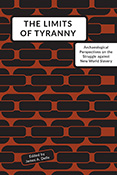The Limits of Tyranny

- Author(s): Delle, James A.
- Series:
- Imprint: Univ Tennessee Press
- Publication Date: 2015-01-16
- Status: Active
- Available in Hardcover - Cloth: Price $84.95 | Buy Now
- Leaf eReader required for PDF ebooks
The long history of slavery in the Americas has left a wealth of archaeological evidence from excavations of southern and Caribbean plantations. These excavations have largely informed our ideas of African slavery, but, more recently, scholars have also focused on northern slave sites and the various degrees of slavery pertaining not only to Africans but to Native Americans and even European immigrants as well. The Limits of Tyranny brings together nine essays that illuminate the struggles of slaves against the structure of inequality found throughout the Americas in the eighteenth and nineteenth centuries.
These essays use the concept of struggle to explore the archaeological dimensions of various sites in the Caribbean and the American South and Northeast. The actions of the enslaved, both collectively and as individuals, altered or eliminated the social forces that oppressed them. The contributors discuss the physical struggle through slave uprisings and organized rebellions and the moral struggle through historic laws and ethical behavior common in the eighteenth and nineteenth centuries. They also define the limits of oppression and use the material evidence associated with each site to determine the lengths to which slaves would go to fight their enslavement.
The Limits of Tyranny advances the study of the African diaspora and reconsiders the African American experience in terms of dominance and resistance. This volume will appeal to any archaeologist looking to move beyond the common discourse on slavery and assess more closely the African struggle against tyranny.
James A. Delle is a professor in the Anthropology and Sociology Department at Kutztown University in Pennsylvania. He is coauthor, with Mark Leone, of An Archaeology of Social Space and coeditor, with Stephen Mrozowski and Robert Paynter, of Lines That Divide: Historical Archaeologies of Race, Class, and Gender.
